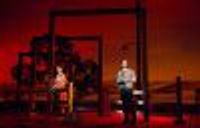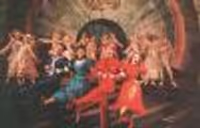A Sondheim rhyme that bothers me
Gaveston2
Broadway Legend Joined: 6/28/11
#125A Sondheim rhyme that bothers me
Posted: 10/31/11 at 4:15pm
In PACIFIC OVERTURES, I think Sondheim uses rhyme to make the act of nagging entertaining in "Chrysanthemum Tea." It's a neat trick to dramatize something boring without actually being boring. The over-rhyming admirals are imitating Gilbert & Sullivan patter songs popular in the period portrayed.
Charley, I'm sorry to hear that Sondheim has bricks "tumbling" instead of "falling" now. "Tumbling" sounds rather gentle, doesn't it? I don't think Mary is describing a gentle event but a sudden calamity and "fall out of" sounds more like her diction to me. I think you're right: Sondheim should have trusted his first instinct.
Those who lived in New York in the early 80s may remember there actually was a spate of incidents where cornices, bricks, etc., fell off buildings and killed pedestrians walking below. I remember that line vividly from the show because it seemed such an obvious reference to recent events. Of course, the scene doesn't take place in 1981, so the deaths weren't recent to Mary and one might argue it took a listener out of the show. But that wasn't always a bad thing with the first MERRILY.
Updated On: 11/2/11 at 04:15 PM
#126A Sondheim rhyme that bothers me
Posted: 10/31/11 at 10:02pm
To go back to the damn Mrs. Lovett not saying "sh*tty" business, I think it works perfectly fine if you simply read it as:
"...it tastes like...(can't think of a good simile)...well...(changes subject to avoid saying sh*tty, the best thing she can think to call the awful pies, in front of a handsome stranger- despite it being the best thing she can think of)...pity a woman alone..." and then bringing it back to her limited wind, since she's too old to be chasing those quick ****cats like Mrs. Moony...maybe she even changes to a line about pitying a woman like her because he must know she was thinking of an inappropriate word and it's her apology/explanation for being so crass? I don't hate it.
Updated On: 10/31/11 at 10:02 PM
#127A Sondheim rhyme that bothers me
Posted: 10/31/11 at 10:20pm
@mysteriousgrowl-- Nice reference to a really fun Tom Lehrer lyric sneaking in to the conversation here!
"An awful debility,
A lessened utility,
A loss of mobility
Is a strong possibility.
In all probability
I'll lose my virility
And you your fertility
And desirability,
And this liability
Of total sterility
Will lead to hostility
And a sense of futility,
So let's act with agility
While we still have facility,
For we'll soon reach senility
And lose the ability"
Just one little note from Professor Guiteau here and my Rhyming 101 lecture-- Sondheim would never generally allow an IDENTITY to replace a proper rhyme if he could help it-- meaning that debility, mobility, possibility, probability, desirability, liability and ability are NONE of them rhymes since the accented syllable starts with the same letter, B.
Proper rhymes aren't absolutely required, I suppose; they're just a lot more fun to hear. Lecture over. There WILL be a quiz.
After Eight
Broadway Legend Joined: 6/5/09
#128A Sondheim rhyme that bothers me
Posted: 10/31/11 at 11:36pm
" Let the guy have some real fun for a change. Then we all benefit, right?"
No, not if his "fun" makes one cringe.
#129A Sondheim rhyme that bothers me
Posted: 11/1/11 at 2:30am
The only thing that bugs me about Chrysanthemum Tea is the repetitive ba-dink-dink-dink-dink-dink of the electric harpsichord, the rest of the song is amazing and some of the lines still enthrall me. My favorite is probably:
"In the tea, my Lord, the chrysanthemum tea —
An informal variation on the normal recipe"
That marvelous internal rhyme and the rolling rhythm get me every time.
Gaveston2 - "Mary's diction" is the perfect phrase and I've always liked "fall outta" because it's a great example of how Sondheim can fill a lyric with characterization. It just sounds like Mary, which was what was so great about the '81 version, the characters sounded so distinct. Mary had a great moment at the Polo lounge that went:
"Joe, is it Joe?
You don't remember me,
Mary Flynn? But why remember me
It's so long ago, but I remember it - [I'm fuzzy on this line]
You sure saved my neck
And I should've mailed a check..."
It just sounds so much like Mary, just like Franklin Shepard Inc. sounds like Charley. It kills me that in their efforts to simplify the plot and clarify the characters they essentially scrubbed the entire libretto of character and concept. Merrily was so daring - flawed, yes, but original and exciting - but now it's about as safe as can be.
This goddam show is gonna be the death of me, I swear.
#130A Sondheim rhyme that bothers me
Posted: 11/1/11 at 8:12amHas anyone considered that he's an old man and this thread could cause him apoplexy?
#131A Sondheim rhyme that bothers me
Posted: 11/1/11 at 8:41am
Oh, ageism. Just what this thread needed!
#132He's Old and His Rhymes Suck
Posted: 11/1/11 at 9:06am
This is now officially the "He's Old and His Rhymes Suck" Thread.
blocked: logan2, Diamonds3, Hamilton22
#133He's Old and His Rhymes Suck
Posted: 11/1/11 at 9:32am
It has nothing to do with his rhyming, but the biggest problem I have with any Sondheim lyric is from Pacific Overtures.
"The Advantages of Floating in the Middle of the Sea" is gorgeous, poetically structured, lyrically evocative, ingeniously introduces The Reader as an endearing central figure, and makes for a splendidly opulent opening number.
However, the central theme that pre-Perry Japan in its isolation from the world is ahistorically idyllic, enjoys a noble stasis free from internal political and social flux, that "nothing happens here," is, if not offensive, down right ridiculous. An Occicentric point of view completely at odds with the rest of this remarkable musical.
Updated On: 11/1/11 at 09:32 AM
Gaveston2
Broadway Legend Joined: 6/28/11
#134He's Old and His Rhymes Suck
Posted: 11/1/11 at 6:46pm
Now wait a minute, henrik! Having studied a little Japanese history (so that I could understand the theater), I believe the idyllic Japan of "Floating in the MIddle of the Sea" may be precisely how the Japanese themselves spoke of their own isolation.
After all, that was the justification for the isolation policy.
You are right, of course, that all sorts of political, social and economic machinations took place on the islands, but all such chaos was hidden beneath a facade of tranquility and order.
A favorite example of mine: the kabuki (originated by a prostitute) was considered too vulgar for the samurai class. But the latter wanted to enjoy the plays. So somebody created an oversized, cone-shaped hat that became the unofficial "disguise" of samurai warriors attending the theater. The "big-ass hat" made the samurai as invisible to other theatergoers as stage attendants dressed in black, yet prevented unfortunate interactions between the samurai and commoners.
So everyone knew the samurai attended the vulgar theater and everyone knew they did not. Tranquil. Ordered. Ideal.
It would not surprise me in the least to read a shogun or samurai writing about the perfect tranquility of isolated Japan, even as he rode forth to fight in one of the numerous civil wars fought under the Tokugawa shoguns.
And doesn't the rest of the play serve to prove just how fragile--even artificial--that tranquility was?
Updated On: 11/1/11 at 06:46 PM
Gaveston2
Broadway Legend Joined: 6/28/11
#135He's Old and His Rhymes Suck
Posted: 11/1/11 at 6:50pm
Charley, I agree with you about the revised MERRILY (which I've only seen in a staged reading, though with an A-list cast (Teri Hatcher, Hugh Panaro, etc.)).
I do think they improved it structurally, but I particularly miss the Mary of the original, who seems to survive only in the first (i.e., "last") scene.
(I've also said elsewhere that going backwards will always make the play ironic rather than dramatic. But, ah, that score!)
#136He's Old and His Rhymes Suck
Posted: 11/1/11 at 7:04pmWow, Gaveston, I humbly defer to you on this. It never occurred to me that the Japanese saw themselves that way.
Gaveston2
Broadway Legend Joined: 6/28/11
#137He's Old and His Rhymes Suck
Posted: 11/1/11 at 7:20pm
I think John Weidman is a serious historian, henrik, and not one to casually condescend to pre-modern cultures.
But your basic objection is a good one and can be applied to far too many Western works. SOUTH PACIFIC isn't a particularly egregious example in my mind, but R&H do quite happily leave out the grittier aspects of Pacific Island cultures that Michener documents in his book. No screaming pigs ritually slaughtered on Hammerstein's Bali Ha'i!
#138He's Old and His Rhymes Suck
Posted: 11/1/11 at 9:25pm
Pacific Overtures often seems to kinda get forgotten (notably it's the only one of the older Sondheim original cast albums that was ignored when they were remastered), but is one of my top scores, and, as seen in the filmed for Japan TV production, is an absolutely thrilling, theatrical show. But I admit as a huge geek for Japanese pop and non culture, I did usd to have some issues with it.
The openignwas one of them, but I finially came around to it for the exact same reasons Gaveston gives, which I think are spot on. Next used to bother me more--I used to get the sense that the feeling from it was kind of a condescending "Look how us Westerners ruined that lovely, delicate Japanese culture". Now I'm more ambivalent on it. Anyone who's spent as long in Japan as I did as a teenaged exchange student (5 monhts) knows that's absolutely not true, and there still is a very vibrant sense of their culture. So I don't think that was the original intention, but I do think some productions treat it that way.
Gaveston2
Broadway Legend Joined: 6/28/11
#139He's Old and His Rhymes Suck
Posted: 11/1/11 at 10:03pm
Thanks, Eric; your experience of Japan is much closer than my book knowledge. I know OVERTURES from the off-Broadway production where numbers like "Next" seemed less all-encompassing, so that the production never struck me as speaking for "Japan as a whole" in the way larger productions may.
I certainly agree with you that although the "modernization" and "Westernization" of Japan may have been miraculous, they were also much more limited than Westerners assumed. Surely nowadays everyone realizes that Japan, despite being a close ally, has a culture quite distinct from ours!
#140He's Old and His Rhymes Suck
Posted: 11/1/11 at 10:38pmI think that's been my mixed feeling about Next. It's sometimes done almost with the implication that Japan lost all of their unique culture which of course isn't remotely true. (Interestingly a more modern phenomenon has been just how much Japanese culture has influenced Western culture, often in subtle ways).
#141He's Old and His Rhymes Suck
Posted: 11/2/11 at 1:11amSome of his rhymes may be clunkers, but there's such great synergy between the different elements in his scores. I don't have all his lyrics memorized (don't shoot me!), but I usually find myself smiling at the cleverness of his lyrics more than I cringe at the awkwardness of the poetry.
Gaveston2
Broadway Legend Joined: 6/28/11
#142He's Old and His Rhymes Suck
Posted: 11/2/11 at 2:27pm
pinoyidol2006, I can say with complete conviction that Stephen Sondheim is the greatest lyricist in the history of the American musical theater (which probably means greatest in the world). And I'd rate him among the top 5 composers of musical theater--at least.
Most of this discussion has been conducted among Sondheim devotees. (After Eight will want me to note that he is the exception.) We're talking about the exceptions we notice precisely because they are so rare in Sondheim's work.
#143He's Old and His Rhymes Suck
Posted: 11/2/11 at 2:53pm
Well, since he's already come up once in the thread...
"I would like to add that [Stephen Sondheim] is the greatest lyricist that the English language has ever produced. And that's a fact, not an opinion."
~~ Tom Lehrer
#144He's Old and His Rhymes Suck
Posted: 11/2/11 at 2:54pmEric, do you know if the Pacific Overtures you saw on Japan TV was the wonderful production the National Theater of Japan brought to Lincoln Center several years ago?
#145He's Old and His Rhymes Suck
Posted: 11/2/11 at 3:15pm
henrik, I believe Eric is referring to the original Broadway production, which for many years circulated on VHS among fans and sold for outrageous prices on eBay before the advent of YouTube, where it now exists in full.
http://www.sondheimguide.com/television.html
See first item under "Part One."
But then I'm sure you already knew this.
After Eight
Broadway Legend Joined: 6/5/09
#146He's Old and His Rhymes Suck (but his boyfriend's cute)
Posted: 11/2/11 at 8:51pm
"pinoyidol2006, I can say with complete conviction that Stephen Sondheim is the greatest lyricist in the history of the American musical theater (which probably means greatest in the world). And I'd rate him among the top 5 composers of musical theater--at least. "
Balderdash.
Absolute, ludicrous balderdash.
And here I thought you were an astute judge of theatre.
Another illusion gone.
And also, since you hardly know every language in the world, perhaps you should refrain from commenting on the lyricists in those languages.
Gaveston2
Broadway Legend Joined: 6/28/11
#147He's Old and His Rhymes Suck (but his boyfriend's cute)
Posted: 11/2/11 at 10:04pm
It's true I don't know every language in the world, After Eight; that's why I qualified my remark with "probably." But I have studied and taught a wide variety of theater traditions from many different cultures: none of them--with the possible exception of the English--put the same, obsessive focus on lyric acuity we find in American musical theater. (And frankly, even the Brits are more casual on the subject.)
And I was speaking in American terms. Zeami, the great poet of medieval Japanese drama, MIGHT be Sondheim's equal, but the aesthetic principles of each are so different that comparing the two really would be to liken an apple to an orange.
The quality of American lyric writing might be one of the reasons why songs from the Golden Age of the American musical remain popular around the world and why every single foreign scholar I have met considers the American musical our great contribution to world culture.
As for Sondheim, my opinion of his primacy as a lyricist is hardly an obscure opinion.
So responding to my opinion with "balderdash" just makes you sound like an 8-year-old taking a temper tantrum. Do try to take a breath before you pass out.
#148He's Old and His Rhymes Suck (but his boyfriend's cute)
Posted: 11/2/11 at 10:14pm
"Balderdash" is a sight more an 88-year-old's word rather than an 8-year-old's word.
js
After Eight
Broadway Legend Joined: 6/5/09
#149He's Old and His Rhymes Suck (but his boyfriend's cute)
Posted: 11/2/11 at 11:28pm
"The quality of American lyric writing might be one of the reasons why songs from the Golden Age of the American musical remain popular around the world and why every single foreign scholar I have met considers the American musical our great contribution to world culture."
I'm sure Hawthorne, Poe, Melville, Whitman, James, O'Neill, Williams, Miller, etc. would be interested to hear that.
"As for Sondheim, my opinion of his primacy as a lyricist is hardly an obscure opinion."
And multitudes thought that the earth revolved around the sun. But they were wrong, now, weren't they?
Now we all know it revolves around Stephen Sondheim.
A bit of friendly advice: Try to go easy on hyperbole. It puts you on shaky ground.
Videos








